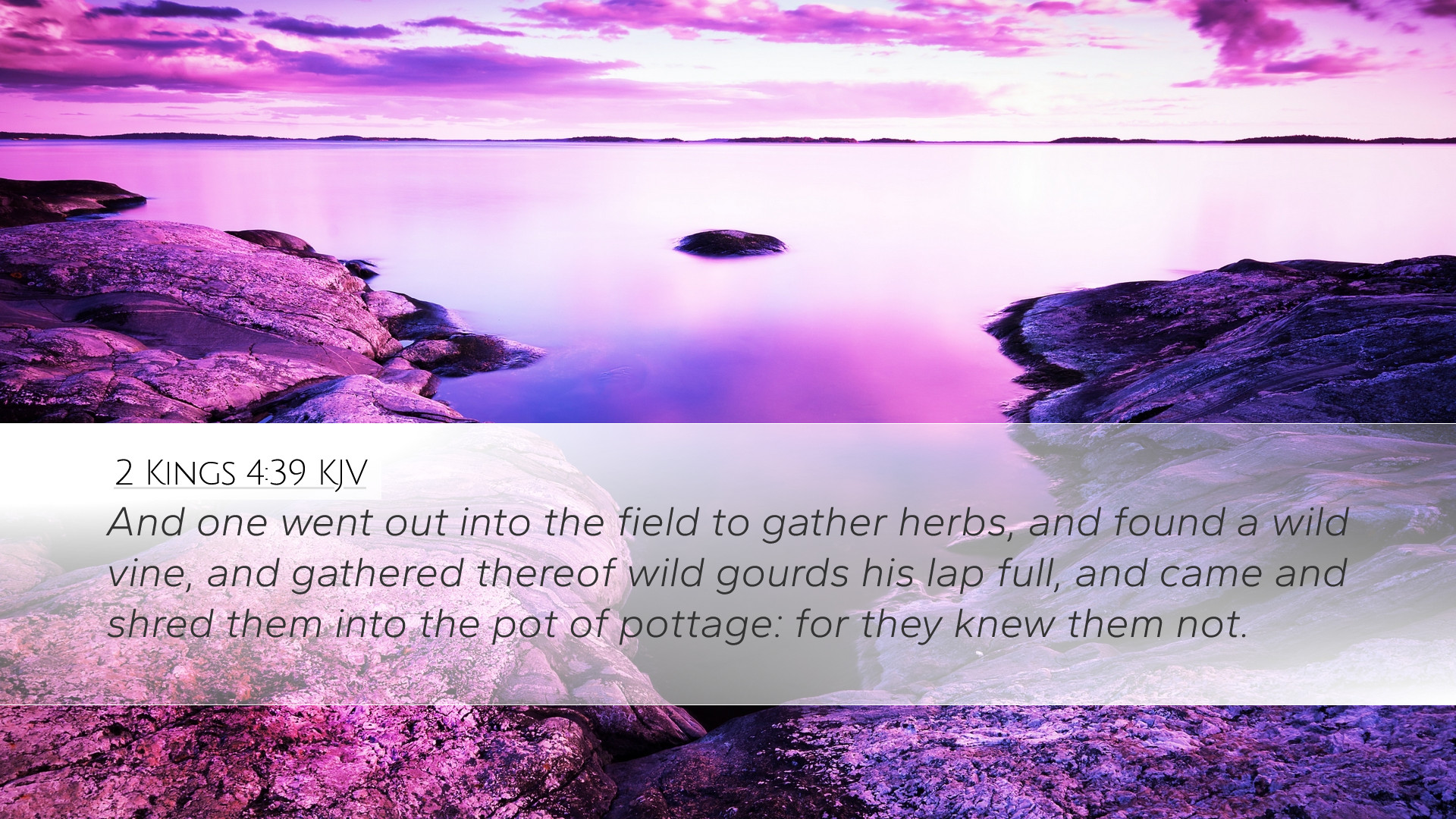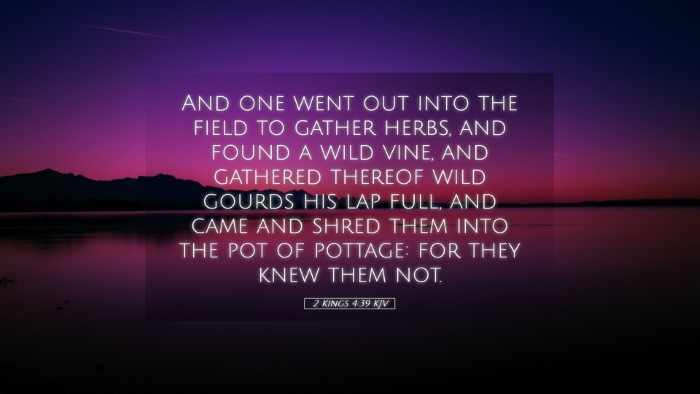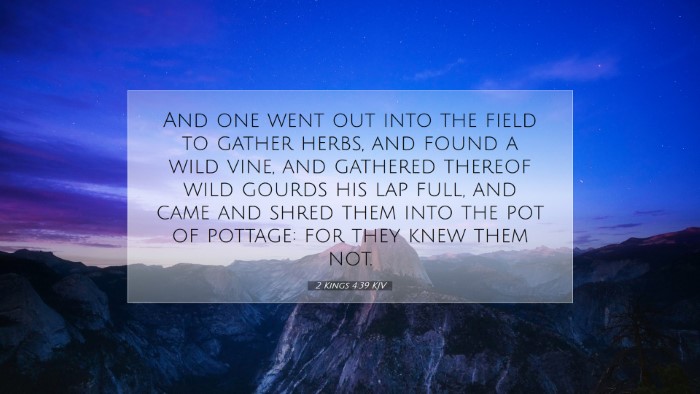Commentary on 2 Kings 4:39
Bible Verse: "And one went out into the field to gather herbs, and found a wild vine, and gathered thereof wild gourds his lap full, and came and shred them into the pot of pottage: for they knew them not." (2 Kings 4:39, KJV)
Introduction
This verse is part of a narrative involving the prophet Elisha and the challenges faced by the prophets of the Lord during a time of famine. The incident not only highlights the miraculous power of God through Elisha but also serves as a profound teaching moment regarding discernment and the consequences of wrongdoing. Commentaries from Matthew Henry, Albert Barnes, and Adam Clarke provide valuable insights into the spiritual and practical implications of this passage.
Context of the Passage
This passage takes place in the context of Elisha's ministry, which was marked by miracles and divine interventions. The preceding verses describe a miraculous provision for a widow's oil and a Shunammite woman's son being raised from the dead. This section illustrates Elisha’s role as a miracle worker and a provider in Israel.
Significance of the Wild Gourds
The mention of “wild gourds” is a critical aspect of this narrative and represents the danger of ignorance and lack of discernment. The gathering of these gourds leads to a near-fatal mistake, serving as a cautionary tale about the importance of wisdom in decision-making.
Commentary Insights
Matthew Henry's Perspective
Matthew Henry emphasizes the theme of divine provision and the risks associated with taking what may seem good without proper knowledge. He notes that the gatherer of the wild gourds acted hastily and without proper discernment, leading the others astray. Henry reflects on how this incident demonstrates the importance of seeking divine guidance in all matters, including mundane tasks like gathering food.
Key Observations from Matthew Henry:
- Danger of Improper Judgment: The gatherer's lack of knowledge about the wild gourds highlights our tendency to make hasty conclusions without seeking God’s wisdom.
- Importance of Community: The shared meal emphasizes the need for discernment within community settings; one person's error can affect many.
- Divine Intervention: Elisha’s ultimate intervention illustrates God’s mercy, transforming a potentially lethal meal into a nourishing one, symbolizing His power to save and restore.
Albert Barnes' Commentary
Albert Barnes provides historical context, noting the significance of herbs and wild food during times of famine. He explains that such food might often be considered a last resort. Barnes emphasizes that the actions of the gatherer were well-meaning but misguided. This reflects a broader spiritual truth about human attempts to remedy situations without full comprehension of risks involved.
Insights from Albert Barnes:
- Misperception of Good: Barnes points out that misidentifying potentially harmful elements as good or beneficial can lead to serious consequences.
- Lessons in Faith: The passage calls for a reliance on divine wisdom when faced with difficult situations and choices.
- Symbolism of Elisha: As a prophet, Elisha represents God's continuous guidance and the transformative power of faith in mundane circumstances.
Adam Clarke's Analysis
Adam Clarke elaborates on the botanicals referenced in the passage, providing insight into the wild gourds’ actual nature. He outlines that these gourds were likely toxic and often confused with edible varieties. Clarke emphasizes the necessity of wisdom in all facets of life, arguing that the believer must seek knowledge and understanding before acting.
Clarke's Key Points:
- Knowledge is Crucial: Clarke reminds readers that not all that appears good is beneficial, and due diligence in understanding is vital.
- Fear and Faith: The fear of not having enough may lead individuals to make poor choices; faith in God’s provision can guard against such impulsivity.
- Culinary Symbolism: Meals in Scripture often have a deeper theological significance, representing divine provision and community.
Theological Implications
The narrative surrounding 2 Kings 4:39 reveals profound theological themes for modern believers.
Moral and Ethical Considerations
- Discernment: Believers are called to exercise discernment not only in spiritual matters but also in day-to-day decisions to avoid pitfalls.
- Community Responsibility: The actions of one can have far-reaching consequences; thus, communal wisdom and accountability are essential.
- Grace and Restoration: God’s grace is sufficient to cover our mistakes; even when we err, His divine intervention is able to redeem situations.
Practical Applications
- Seek Counsel: In challenging times, believers should seek godly counsel and wisdom before action.
- Value of Community: Engage with trusted community members to prevent personal misjudgments from impacting the collective.
- Trust in God’s Provision: Maintain faith in God's ability to provide, especially in times of uncertainty.
Conclusion
2 Kings 4:39 offers rich theological and practical insights that are as relevant today as they were in ancient Israel. The interplay between error and divine intervention serves as an enduring reminder of God’s grace, urging believers to exercise discernment and to rely on His provision. Through the commentaries of Matthew Henry, Albert Barnes, and Adam Clarke, individuals can glean deeper wisdom and understanding from this critical passage.


